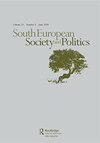情感和地域两极分化:对西班牙投票选择的影响
IF 4.6
1区 社会学
Q1 POLITICAL SCIENCE
引用次数: 4
摘要
情感极化对投票选择的影响是什么?尽管对党派情感两极化的研究兴趣日益浓厚,但学者们对党派情感两极化与政治行为之间的关系仍未完全理解。至关重要的是,大多数现有研究都假设(通常是默认的),情感两极分化主要发生在单一的政治党派认同上。本文解决了迄今为止被忽视的西班牙情感两极分化与投票选择之间的关系,在西班牙,不同和相反群体之间的不信任发生在意识形态和领土方面。使用丰富的面板数据,研究结果表明,两种情感极化类型都是投票选择的重要预测因素。在情感上,党派极化的选民更有可能支持左翼,而在领土层面上情感极化的选民更有可能支持右翼。本文章由计算机程序翻译,如有差异,请以英文原文为准。
Affective and Territorial Polarisation: The Impact on Vote Choice in Spain
ABSTRACT What is the effect of affective polarisation on vote choice? Despite the growing interest in affective polarisation, scholars still do not fully understand the relationship between partisan affective polarisation and political behaviour. Crucially, most existing studies have assumed, often by default, that affective polarisation mainly occurs along a single politicised partisan identity. This article addresses the hitherto neglected relationship between affective polarisation and vote choice in Spain, where distrust between different and opposite groups occurs both on ideological and territorial terms. Using rich panel data, the study findings show that both affective polarisation types are significant predictors of vote choice. While affectively partisan-polarised voters are more likely to support the left, affectively polarised voters on the territorial dimension are more likely to support the right.
求助全文
通过发布文献求助,成功后即可免费获取论文全文。
去求助
来源期刊

South European Society and Politics
Multiple-
CiteScore
5.80
自引率
21.20%
发文量
14
期刊介绍:
A leading point of reference for scholars of Southern Europe, South European Society and Politics promotes both comparative and inter-disciplinary analyses, as well as offering innovative single county and sub-national studies. The journal acts as a forum for social, economic, cultural, contemporary historical and political approaches to research on the region, and is particularly keen to sponsor policy–focused studies in all these disciplines. The journal publishes research articles; South European Atlas with election reports and articles on other subjects of topical interest, and an extensive book reviews section, including both review articles and individual book reviews.
 求助内容:
求助内容: 应助结果提醒方式:
应助结果提醒方式:


